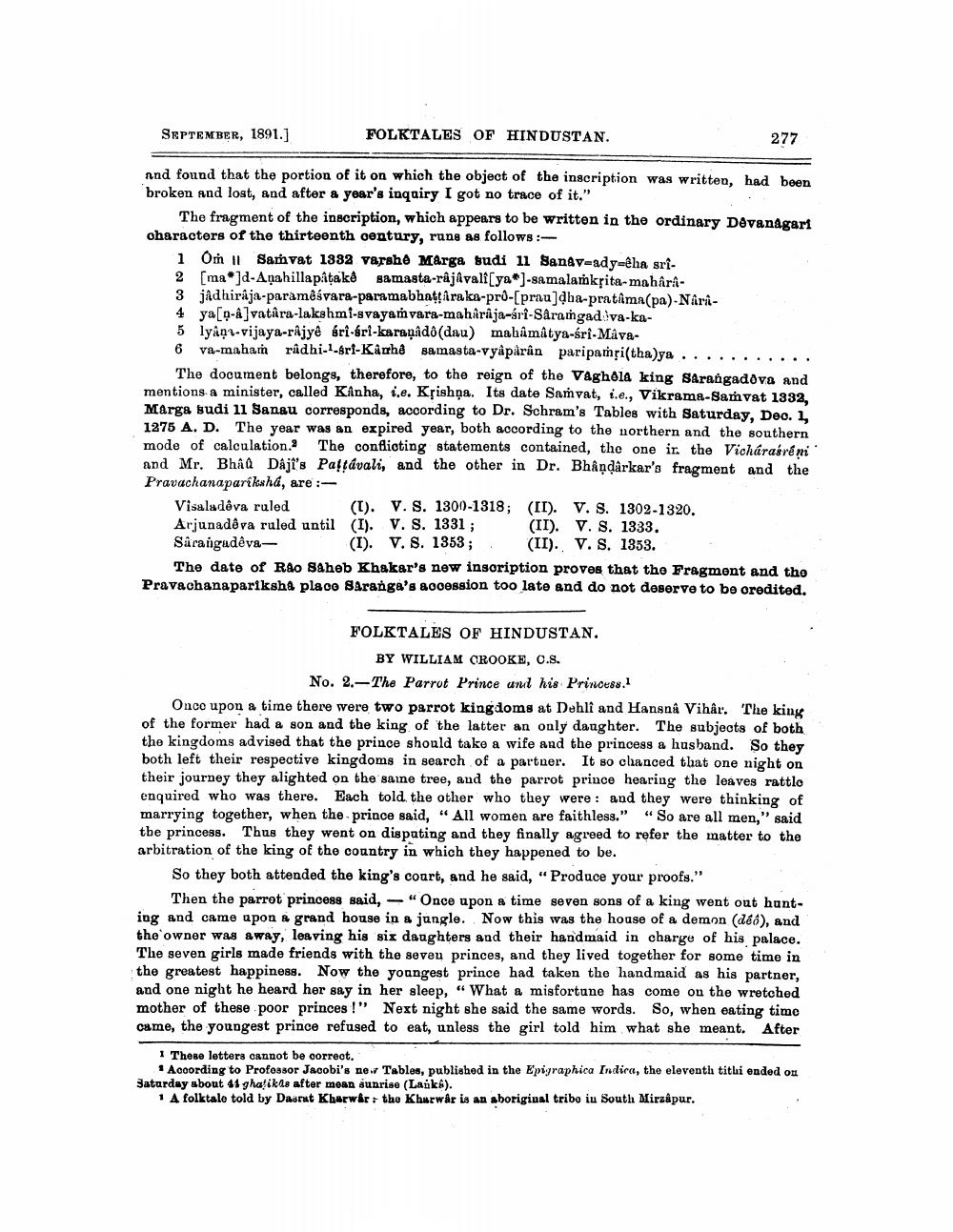________________
SEPTEMBER, 1891.]
FOLKTALES OF HINDUSTAN.
277
and found that the portion of it on which the object of the inscription was written, had been broken and lost, and after a year's inquiry I got no trace of it."
The fragment of the inscription, which appears to be written in the ordinary Devanagari oharacters of the thirteenth century, rune as follows:
i Om | Samvat 1882 varshe Marga sudi 11 Sanav=ady-êha sri2 [ma]d-Anahillapatake samasta-râjâvali(ya*)-samalamkrita-mahara3 jâdhiraja-paramôśvara-paramabhattara ka-pro-[prnu]dba-pratima(pa). Nari4 ya[q-]vatara-lakshmi-svayamvara-mahårâja-sri-Saramgad va-ka5 lyán -vijaya-rajyé éri-sri-karanado(dau) mahamätya-sri-Mava6 va-mahar râdhi---sri-Kath8 samasta-vyâpârân paripamri(tha)ya ...........
The document belongs, therefore, to the reign of the Vaghola king Sarangadova and mentions a minister, called Kinha, i.e. Krishņa. Its date Samvat, i.e., Vikrama-Samvat 1332, Marga sudi 11 Sanau corresponds, according to Dr. Schram's Tables with Saturday, Dec. 1. 1275 A. D. The year was an expired year, both according to the northern and the southern mode of calculation. The conflicting statements contained, the one ir. the Vichárasréni and Mr. BhQ Daji's Pattávali, and the other in Dr. Bhåndarkar's fragment and the Pravachanapariksha, are :
Visaladôva ruled (I). V. S. 1300-1318; (II). V. S. 1302-1320. Arjunadê va ruled until (I). V. S. 1331 ; (II). V. S. 1333. Sarangudêva
(I). V. S. 1353; . (II). V. S. 1353. The date of RAO Saheb Khakar's new inscription proves that tho Fragment and tho Pravachanapariksha place Saranga's accession too late and do not deserve to be oredited.
FOLKTALES OF HINDUSTAN.
BY WILLIAM CROOKE, C.S.
No. 2.-The Parrot Prince and his Princess. Once upon a time there were two parrot kingdoms at Dehli and Hansna Vihar. The king of the former had a son and the king of the latter an only daughter. The subjects of both the kingdoms advised that the prince should take a wife and the princess a husband. So they both left their respective kingdoms in search of a partner. It so chanced that one night on their journey they alighted on the saine tree, and the parrot prince hearing the leaves rattlo enquired who was there. Each told the other who they were : and they were thinking of marrying together, when the prince said, “All women are faithless." "So are all men," said the princess. Thus they went on dispating and they finally agreed to refer the matter to the arbitration of the king of the country in which they happened to be.
So they both attended the king's court, and he said, " Produce your proofs."
Then the parrot princess said, "Once upon a time seven sons of a king went out hunting and came upon a grand house in a jungle. Now this was the house of a demon (déb), and the owner was away, leaving his six daughters and their handmaid in charge of his palace. The seven girls made friends with the seven princes, and they lived together for some time in the greatest happiness. Now the youngest prince had taken the handmaid as his partner, and one night he heard her say in her sleep, “What a misfortune has come on the wretched mother of these poor princes !" Next night she said the same words. So, when eating time came, the youngest prince refused to eat, unless the girl told him what she meant. After
1 These letters cannot be correct.
1 According to Profossor Jacobi's ner Tablos, published in the Epigraphica Indira, the eleventh tithi ended ou Saturday about 41 ghalikls after mean sunrise (Lauks).
1 A folktalo told by Dasrat Kharwar - the Kharwår is an aboriginal tribo iu South Mirzapur.




